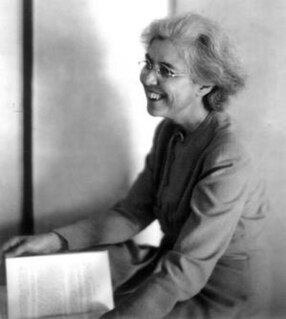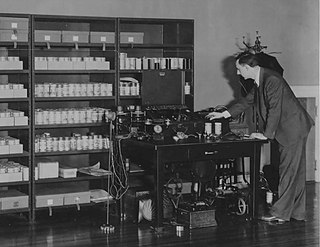
Alan Lomax was an American ethnomusicologist, best known for his numerous field recordings of folk music of the 20th century. He was also a musician himself, as well as a folklorist, archivist, writer, scholar, political activist, oral historian, and film-maker. Lomax produced recordings, concerts, and radio shows in the US and in England, which played an important role in preserving folk music traditions in both countries, and helped start both the American and British folk revivals of the 1940s, 1950s and early 1960s. He collected material first with his father, folklorist and collector John A. Lomax, and later alone and with others, Lomax recorded thousands of songs and interviews for the Archive of American Folk Song, of which he was the director, at the Library of Congress on aluminum and acetate discs.

"Kum ba yah" is a spiritual song first recorded in the 1920s. It became a standard campfire song in scouting and summer camps and enjoyed broader popularity during the folk revival of the 1950s and 1960s.
"Mademoiselle from Armentières" is an English song that was particularly popular during World War I. It is also known by its ersatz French hook line, Hinky Dinky Parlez-vous.
The The Archive of Folk Culture was established in 1928 as the first national collection of American folk music in the United States of America. It was initially part of the Music Division of the Library of Congress and now resides in the American Folklife Center.
Alan Jabbour was an American musician and folklorist, and the founding director of the American Folklife Center at the Library of Congress.

The American Folklife Center at the Library of Congress in Washington, D.C. was created by Congress in 1976 "to preserve and present American Folklife". The center includes the Archive of Folk Culture, established at the Library in 1928 as a repository for American folk music. The center and its collections have grown to encompass all aspects of folklore and folklife worldwide.
Benjamin Albert Botkin was an American folklorist and scholar.
Peggy Bulger is a folklorist and served as the director of the American Folklife Center at the Library of Congress from 1999 to 2011, when she moved to Florida to continue work on personal projects.
James Madison Carpenter, born in 1888 in Blacklands, Mississippi, near Booneville, in Prentiss County, was a Methodist minister and scholar of American and British folklore. He received his Bachelor of Arts and Master of Arts degrees from the University of Mississippi, and the Doctor of Philosophy degree from Harvard in 1929. He is best known for his substantial work collecting folk songs in England, Scotland and Wales. He recorded well-known singers and musicians that other folklorists had documented, as well as some never recorded before or since such as Bell Duncan, whose repertoire consisted of some 300 songs, including 65 Child ballads. His collection methods included Dictaphone recordings as well as transcriptions of lyrics.

Archie Green was an American folklorist specializing in laborlore and American folk music. Devoted to understanding vernacular culture, he gathered and commented upon the speech, stories, songs, emblems, rituals, art, artifacts, memorials, and landmarks which constitute laborlore. He is credited with winning Congressional support for passage of the American Folklife Preservation Act of 1976, which established the American Folklife Center in the Library of Congress.

Helen Hartness Flanders, a native of the U.S. state of Vermont, was an internationally recognized ballad collector and an authority on the folk music found in New England and the British Isles. At the initiative of the Vermont Commission on Country Life, Flanders commenced a three-decade career capturing traditional songs that were sung in New England—songs that, in many cases, traced their origin to the British Isles. The timing of her life work was critical, coming as it did when people were turning away from traditional music in favor of listening to the radio. Today her nearly 4,500 field recordings, transcriptions and analyses are housed at the Flanders Ballad Collection at Middlebury College, Middlebury, Vermont and have been a resource for scholars and folk singers, since the establishment of the collection in 1941.
Dr. Anthony Grant Barrand is an academic and musician residing in Brattleboro, Vermont. He is a Professor Emeritus of Anthropology, College of Arts and Sciences, Boston University, where his courses included "Stalking the Wild Mind: The Psychology and Folklore of Extra-Sensory Perception and Psychic Phenomena", "English Ritual Dance and Drama", and "Folk Songs as Social History".
Delia Green was a 14-year-old African-American murder victim who has been identified as the likely inspiration for several well-known traditional American songs, usually known by the titles "Delia" and "Delia's Gone".
"Git Along, Little Dogies" is a traditional cowboy ballad, also performed under the title "Whoopie Ti Yi Yo." It is believed to be a variation of a traditional Irish ballad about an old man rocking a cradle. The cowboy adaptation is first mentioned in the 1893 journal of Owen Wister, author of The Virginian. Through Wister's influence, the melody and lyrics were first published in 1910 in John Lomax's Cowboy Songs and Other Frontier Ballads. It is cataloged as Roud Folk Song Index No. 827. Members of the Western Writers of America chose it as one of the Top 100 Western songs of all time.
"Bang Bang Lulu" is a traditional American song with many variations. It derives from older songs most commonly known as "Bang Bang Rosie" in Ireland, "Bang Away Lulu" in Appalachia, and "My Lula Gal" in the West. The form "Bang Bang Lulu" became widespread in the United States from its use as a cadence during the World Wars. The song uses the tune of "Goodnight, Ladies".
George Korson was a folklorist, journalist, and historian. He has been cited as a pioneer collector of industrial folklore, and according to Michael Taft of the Library of Congress, "may very well be considered the father of occupational folklore studies in the United States." In addition to writing and editing a number of influential books, he also issued his field recordings of coal miners on two LP records for the Library of Congress.
Anna Lomax Wood is an anthropologist and public folklorist. She is the President of the Association for Cultural Equity (ACE), established in 1985 by her father, legendary musicologist Alan Lomax. In 1996, when Alan Lomax was disabled by a stroke, Wood took responsibility for overseeing his archive, housed at Hunter College, and implementing his unfinished projects, most notably the production, which she undertook in 1997 with Jeffry Greenberg, of the Alan Lomax Collection on Rounder Records a series of more than 100 CD's in ten series, of music recorded by Alan Lomax in the deep South, the Bahamas, the Caribbean, the British Isles, Ireland, Spain and Italy. Upon her father's death in 2002, ACE worked with the Library of Congress to preserve, restore, digitize, and transfer Alan Lomax's original recordings, photographs, and videos to the Library's American Folklife Center,}} In 2005, Wood and Mr. Greenberg produced an 8-CD box set issued on Rounder: Jelly Roll Morton: The Complete Library of Congress Recordings by Alan Lomax. In 2009, she produced the 10-CD, Alan Lomax in Haiti, issued by Harte Records.
Helen Heffron Roberts (1888–1985) was an American anthropologist and pioneer ethnomusicologist. Her work included the study of the origins and development of music among the Jamaican Maroons, and the Puebloan peoples of the American southwest. Her recordings of ancient Hawaiian meles are archived at the Bernice P. Bishop Museum in Honolulu. Roberts was a protege of Alfred V. Kidder and Franz Boas.

The Southern Folklife Collection is an archival resource at the University of North Carolina at Chapel Hill, dedicated to collecting, preserving and disseminating traditional and vernacular music, art, and culture related to the American South. The Southern Folklife Collection is located in UNC's Louis Round Wilson Special Collections Library.







